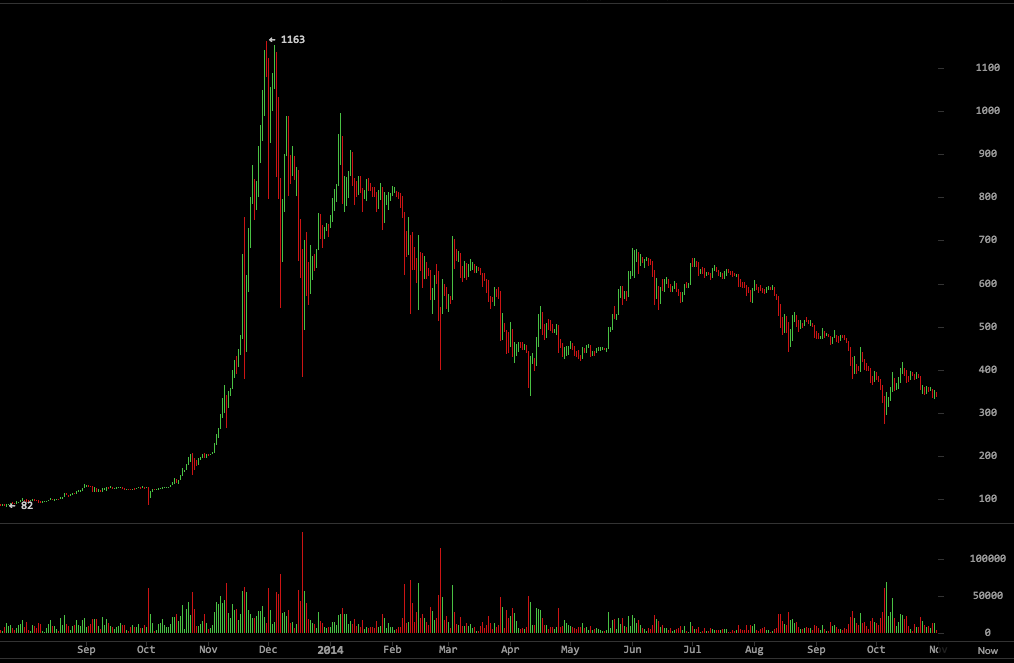Bitcoin is a crypto-currency, “a digital currency in which encryption techniques are used to regulate the generation of units of currency and verify the transfer of funds, operating independently of a central bank”(Google Dictionary). The unit of account is also called a bitcoin, but it is not capitalized.
The Characteristics Required For Long and Lasting Value
At the moment, the supply of bitcoins is incrementally increased by rewarding “miners” with bitcoins (they provide computer processing resources and encryption). Otherwise, bitcoins are in limited supply and the amount of increase is strictly controlled. There’s an ultimate cap set and increases in supply occur in accordance with a predetermined formula.
Bitcoin possesses the two key elements required to have high and lasting future value – scarcity and control over supply.
Understanding How Bitcoin Is Quoted
Bitcoin is usually quoted against the USD. For example, Bitstamp, a large exchange, quotes Bitcoin/USD. As such, the Bitcoin price has been declining versus the USD in much the same way as other major currencies have declined against the USD this year, so the chart is pointing down. However, the Bitcoin fluctuations can add up to large percentages of the holding value from day to day, week to week and so on.

A Store of Wealth
It is important to understand that Bitcoin is not controlled or aligned with any particular country, so it’s not controlled by any government’s economic monetary policy. When there are major redistributions of wealth between countries, such as economic problems in the Eurozone that cause the euro (EUR) to fall, a decentralized currency, such as Bitcoin, might become an attractive insulator from those forces. The independence and decentralized nature of Bitcoin has the potential to:
- Insulate wealth from the impact of fluctuations in a country’s fortunes.
- Protect wealth in high inflation economies.
- Have purchasing power to buy goods and services in any country, provided the vendor is accepting it as a means of exchange.
The value of the bitcoin is highly volatile. It can fluctuate wildly both up and down. The high for 2014 was $995 and the low $275. It does not have the trading volume that major currencies have, but it still sees millions of dollars of value traded each day. At the moment, Bitcoin is a wild ride option for storing wealth, but in the future that’s likely to change.
Transaction Costs Are Very Low
Low transaction costs for global Bitcoin transactions are likely to help make the digital currency attractive. Transaction costs to exchange Bitcoin are nominal when compared to bank transfers and overseas credit card transaction charges. Once you have bitcoins in an electronic “wallet,” you’re able to buy and sell goods through exchanges between wallets for the cost of less than $1. This is the fee paid to the “miner” who provides the computing resources for the Bitcoin network platform. Interestingly, the payment of a mining fee is optional, but miners can pick and choose which transactions to process. More likely than not, though, paying the fee will help your processing speed.
Increased Vendor Acceptance
Vendors are increasingly accepting Bitcoin as payment. Companies offering Bitcoin merchant services encourage vendors to automate the sale of bitcoins received, so they lessen the impact of fluctuations in the value of Bitcoin currency they receive. Companies may also want to avoid holding a speculative position in bitcoins because it increases their balance sheet risk. This kind of vendor selling may be contributing to short-term downward pressure on Bitcoin, as the vendors receive bitcoins and immediately dump them in an automated fashion. Until there’s significant daily volume traded, the strong increase in vendors’ accepting bitcoins may depress the price. However, over time, this will likely be offset by the increase in people purchasing bitcoins for payment for goods and services.
High Industry Investment
There’s a lot of investment in Bitcoin-related and peripheral products and services. Aside from vendors accepting Bitcoin as a means of exchange, there’s a whole new industry being born – Bitcoin merchants, exchanges, wallet providers, margin trading providers, are springing up, and other innovative companies capitalizing on the new industry are being created. New tools are being created to make it easier for non-technical people to buy, hold, and spend bitcoins, creating a greater platform for more widespread use. The large investment made into the industry will likely further cement the growth and acceptance of the Bitcoin currency.
Traditional Banks Make It Difficult
It’s reported that many global banks are making it difficult for companies involved in the Bitcoin industry to obtain traditional banking services and for individuals to make payments to/from Bitcoin operators. This is making it difficult to transact, but the industry still grows in spite of this, as if it has a life of its own.
The reasons traditional banks are trying to make life difficult in the Bitcoin space are not hard to discern – banks do not understand the true risk (or the lack thereof) and banks feel threatened. Thus, banks try to obstruct money flow in non-government controlled currencies to repress any currency that operates outside of their vaults.
The acceptance of digital currencies is a phenomenon that can’t be stopped, so it seems best for banks to better understand Bitcoin and then to accept it quickly to gain a competitive advantage in the currency space.
Conclusion
Is Bitcoin a currency of the future? Bitcoin industry leaders, global vendors, and big investors are betting on the new currency. As well, as we increasingly become a global marketplace, markets will demand a global currency. Bitcoin could fill the demand. Bitcoin is now and looks to remain the market leader in the crypto-currency space, so you may find it part of your future.
*****
Read a related story:
Forex Tips: When Trading Discipline Goes Too Far




